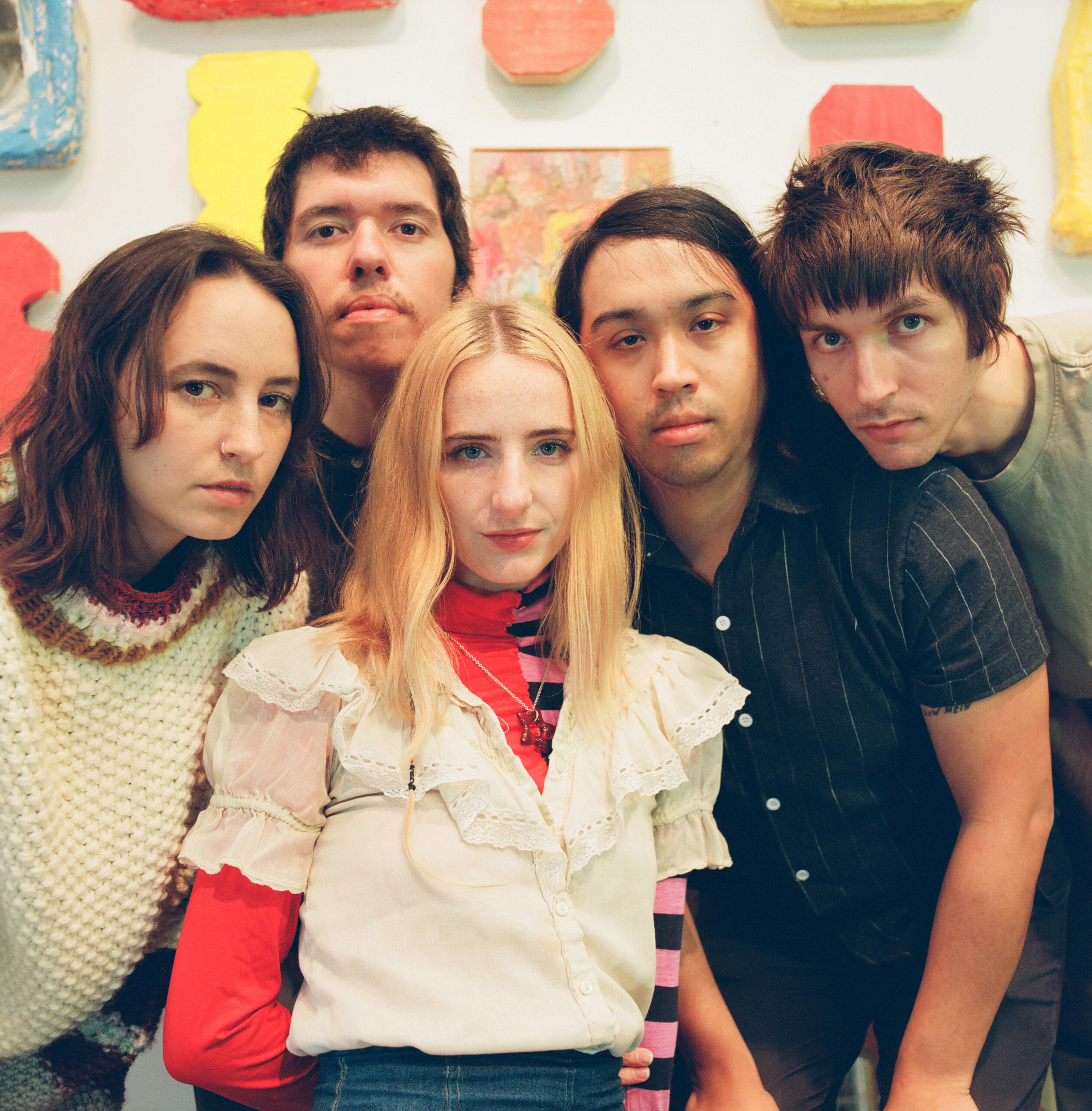Nobody expected things to go this way for Foyer Red, least of all Foyer Red themselves.
The band began casually, an idea hatched earlier but born from pandemic stir craziness. Unable to continue with their restaurant gigs during lockdown, partners Elana Riordan and Marco Ocampo passed their time at home by emailing song ideas back and forth with their friend Mitch Myers. (Though each member contributed various parts back then, things settled into Riordan being the lead vocalist and clarinetist, Ocampo the drummer, with Myers on guitar and vocals.) By the fall of 2021, Foyer Red’s sound had cohered, they had recorded an EP and expanded to a quintet including bassist Eric Jaso and guitarist/vocalist Kristina Moore. Their first show was in September of that year, at a now-defunct house venue in the no man’s land between the north Brooklyn neighborhoods of Williamsburg and Bushwick. About a month later, Carpark Records approached them at their third show; they soon signed to the label and began work on a debut album. What had started as a quirky outlet, a local band made up of friends with their own various projects, had taken off.
Even now, on a spring day in 2023, Foyer Red can sometimes come across like they’re still making sense of their whirlwind origins. The five members have gathered at the Bushwick bar Honore Club — a fitting location, given it’s a neighborhood haunt where musicians and service industry folk frequently mingle, and where the individual members of Foyer Red were once regulars. It’s a sunny afternoon before the band has an opening slot performance at the nearby Brooklyn Made, and they begin to explain how the wild ride of their debut, Yarn The Hours Away, came to be.
Foyer Red has that old-school band-as-gang vibe. Ocampo is like the captain, toggling between looking at work on his laptop and jumping into a conversation to offer big-picture summary answers about the band. Despite some classical training and playing in marching bands when she was younger, Riordan is the newest to the life of a professional musician, and her answers are often bemused and searching — like she’s still finding her way. Myers is quiet, with an intense gaze, but when he interjects it’s usually with the warmest sentiments, hyping up his bandmates. Moore and Jaso fill in the colors at the edge of the band’s story, sometimes with serene clarity and sometimes with hilarious asides. They are also a hodgepodge, with a broad range in age and experience. Riordan is the youngest at 26, and Ocampo is 29, while Myers, Jaso, and Moore are all in their early 30s; accordingly, the older members have also been through the ringer with a variety of other musical endeavors in their years.
Though it is still mid-afternoon, the backyard of the bar is filling up with day shift patrons, some “working” over their first beer-and-shot combo, chain-smoked cigarettes already filling the air. You could mistake Foyer Red for what they were originally — just another group of friends dizzyingly, effervescently riffing off each other over a drink. But when they all joined together as a band, that pre-established camaraderie meant they quickly evolved into a many-headed but single organism. Whether in conversation or songwriting, Foyer Red is a constant back-and-forth — finishing each other’s sentences, extending from each other’s thoughts, a whole portrait that only makes sense with five viewpoints tangling together.
In the early trio iteration, Foyer Red tried a few different directions, but their aesthetic cohered quickly. Their sound is an often giddy, zany art-punk; you get the sense no ideas are off limits. Ocampo recalls that very quickly they decided the “zig-zaggy” vocals, where Riordan and Myers can volley or sometimes almost talk over each other, were crucial to Foyer Red’s identity. The early intricacies of Foyer Red have grown even more sophisticated once they became a quintet, Moore’s warped guitar buoying Myers’ spindlier lines, Jaso’s dexterous bass locking into the band’s erratic shape-shifting rhythms. (“Etc,” a key track on the album, originated from a bassline Jaso had been toying around with for years.)
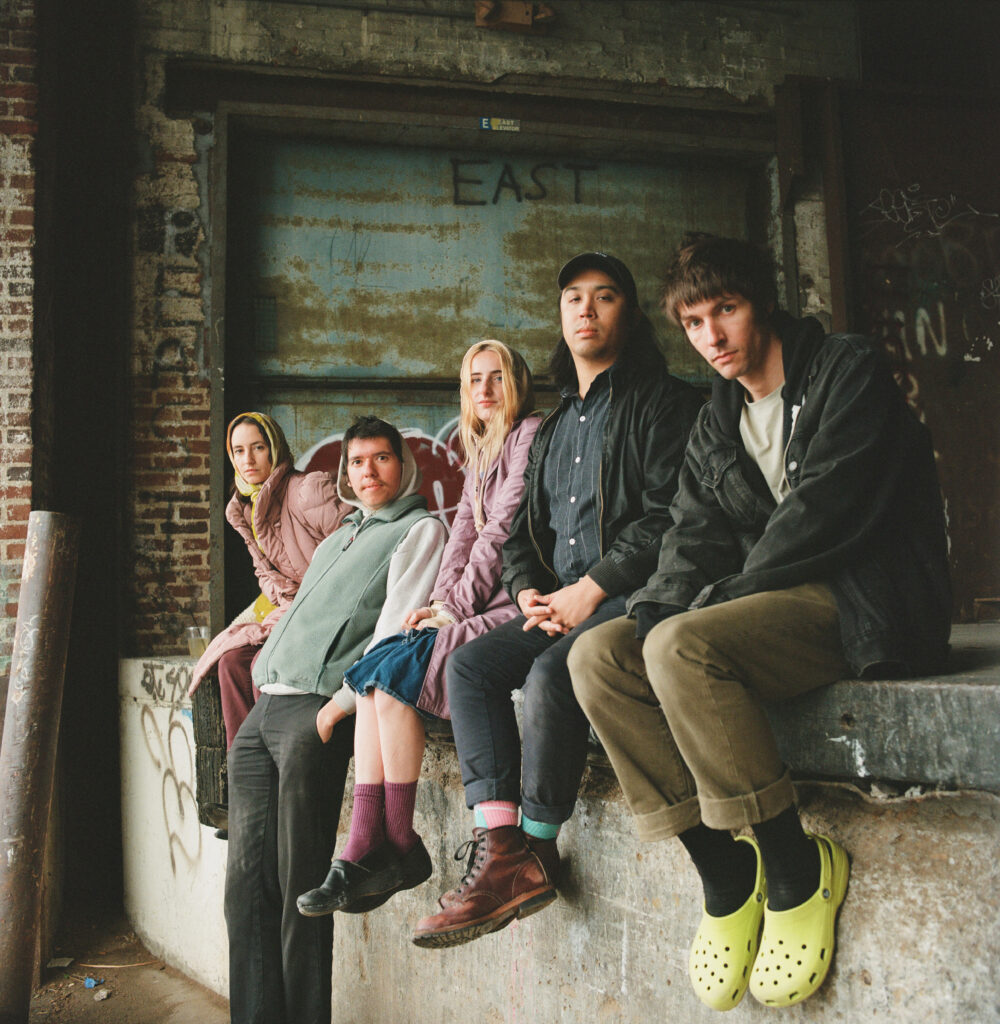
Foyer Red’s compositions can feel like a frenetic exchange between over-stimulated minds. They all joke that many of the songs have weird time signatures or shifts, but they all count the measures differently and somehow it lines up. They stumble a bit, trying to explain how they fit these puzzles together, before Ocampo matter-of-factly butts in.
“Also, we have a whiteboard,” he admits, and everyone laughs. “We’ve been using a smaller one and I’m hyped to get our bigger one back.”
Even though Ocampo and Myers religiously diagram and dissect, even there different members of Foyer Red find their own way into the music. “I kind of ignore it,” Riordan quips. “It’s just going to confuse me.”
Naturally, the addition of Jaso and Moore meant Foyer Red’s process continued to overflow creatively, but also grew increasingly complex.
“I think we embrace a lot of chaos,” Moore says of the band’s writing. “A lot of these time changes and vocals, the children at play shit — that’s all stuff that happened organically.”
“It’s very conversational,” Jaso adds.
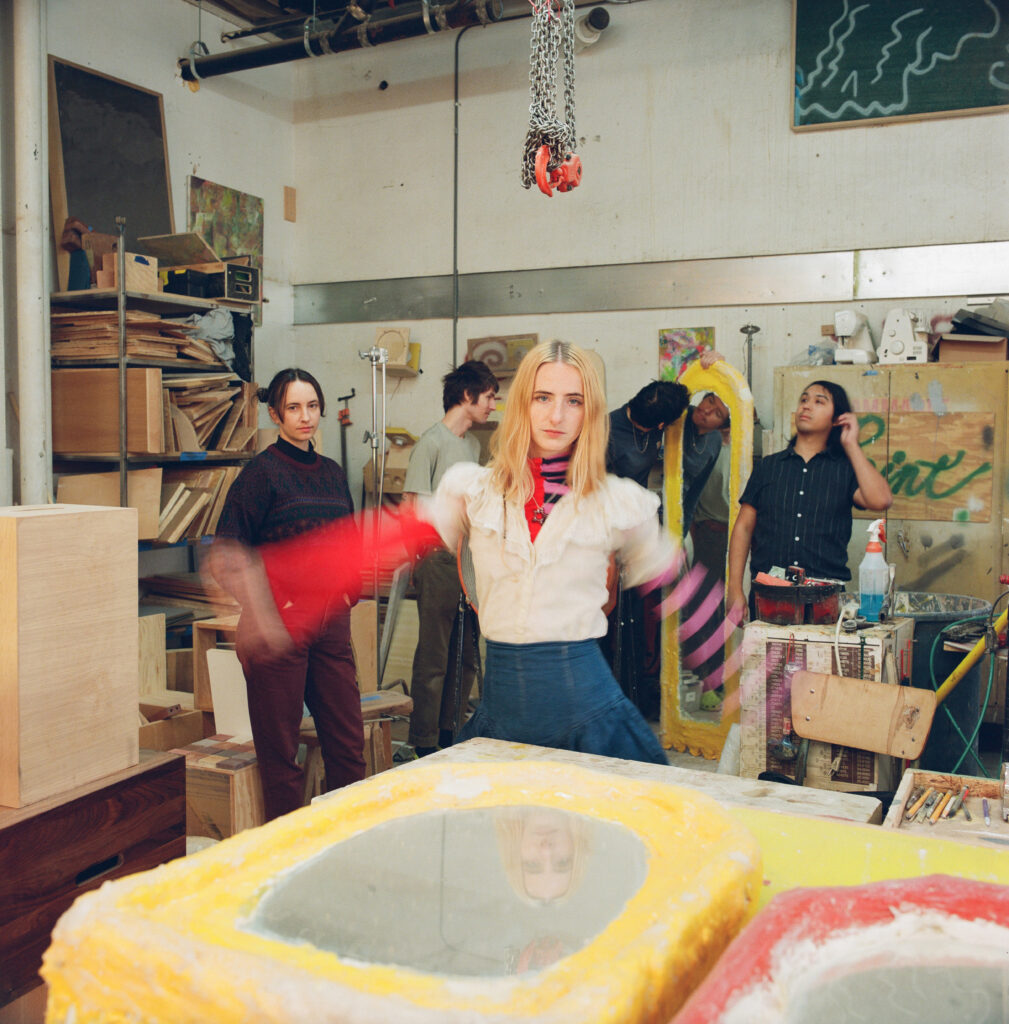
Ocampo once imagined Foyer Red as the sort of local band that would just play around town for fun. But between Carpark entering the picture and facets of normal life returning in the second half of 2021, things got real fast. At the time, Ocampo and Moore were both pulling doubles at the same Mexican restaurant — the band would get together at eight in the morning on Sunday, write new songs for what became Yarn The Hours Away, then Ocampo and Moore would go to work. Meanwhile, Riordan had to make sense of how quickly her life was changing. In the past, she’d contributed clarinet to the band Straw Pipes, but she had never been a frontwoman, or primary vocalist and lyricist for a band.
“It became a lot of pressure,” she recalls while avoiding eye contact, measured and reflective. “I was very shy about everything. I feel like I’m still getting used to being onstage and talking.”
After working with P.E. member Jonathan Schenke on some interim singles, Foyer Red linked back up with the producer for their debut. Riordan characterizes Yarn The Hours Away as a collection of short stories. Innocent images abound: video games, animals. Yarn The Hours Away charges out the gate with “Plumbers Unite!,” a song that is first all frayed propulsion then turns into a squiggly sigh as all three vocalists weave around each other in the chorus. It’s one example of a song in which the band uses those childlike themes as a mechanism to talk about frayed emotions in a claustrophobic digital landscape, or the crushing weight of trying to survive under late capitalism.
Each vocalist writes their own lyrics, so Myers and Moore are often layering around Riordan’s leads — sometimes, as with Myers’ composition “Time Slips,” they trade notes in order to unpack heavier themes, like their perceptions of mortality. Sometimes it’s quite the opposite, with each writer chasing their own muse and letting tones and stories collide.
“Someone said it’s almost like we don’t listen to each other,” Myers says. “‘Etc’ is the extreme of that — Elana’s building these very majestic existential questions and is enraptured in fantasy, and my lyrics are trying to be very rational and robotic—”
“Do you like that?” Ocampo asks.
Myers is caught off guard while Moore laughs at his shoulder. “Do you like it?”
“I like it, but I’m asking you,” Ocampo says.
“I think that’s something that’s been fun,” Myers gamely finishes over Ocampo’s apologies. “There’s no formula.”
“‘Wetland Walk’ is like that too,” Moore adds, referencing the sideways swoon of a track that is part Riordan’s childhood recollection and part eerie fairytale. “Elana is telling a story, and Mitch is telling a story, and I decided I was going to tell the perspective of… being a swamp monster.”
“The label was emailing us about that song like ‘OK, Mitch is the swamp monster,” Ocampo recounts. “I was like, ‘No, Kristina is the swamp monster.’”
“In that song it feels like we’re all little kids trying to play a game of ‘I’m this person!’” Riordan concludes.
The playfulness inherent to Foyer Red’s music and lyrics is almost like a balm. “It’s a reflection of my brain and how I think about things,” Riordan says. “My brain is very scattered in a fun way. Lyrically, it’s like: How do you synthesize the world at this moment, and the world we grew up in? It comes out all crazy and weird.”
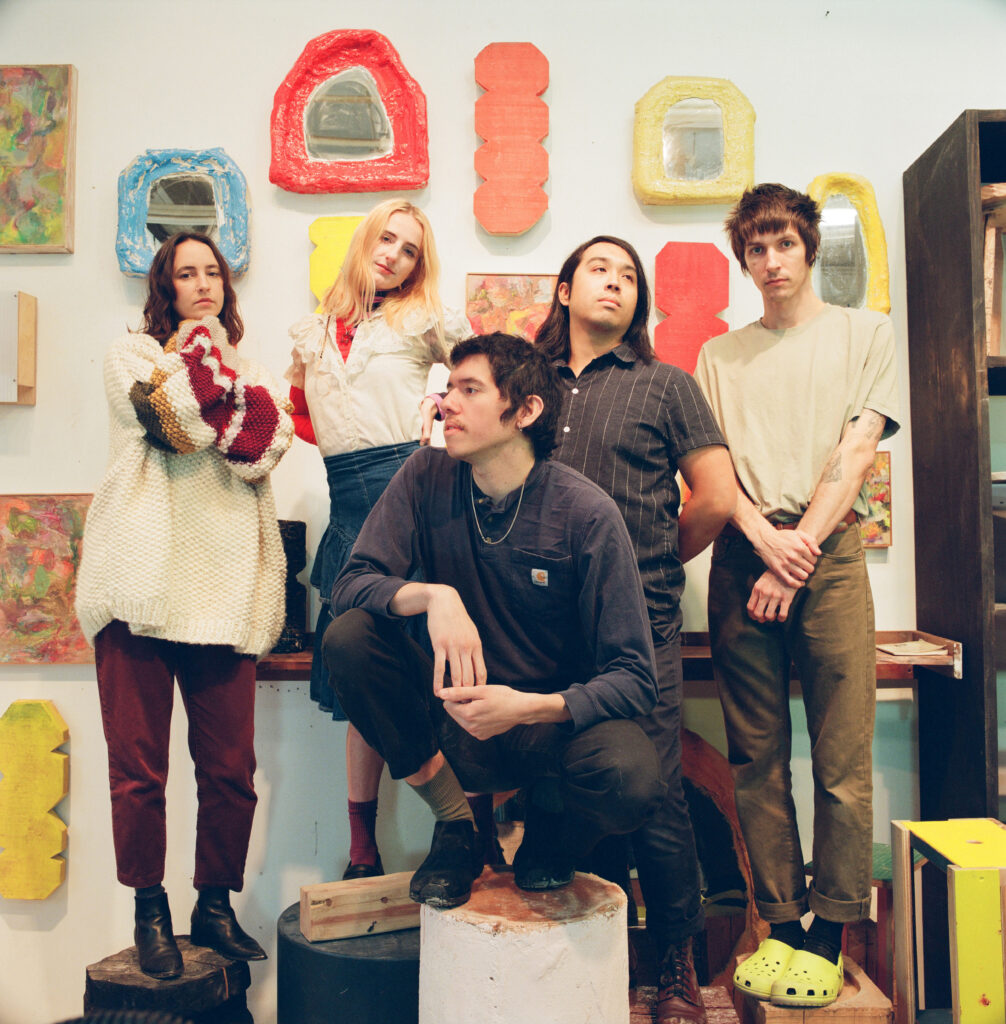
The album title Yarn The Hours Away comes from its epic closer “Toy Wagon,” a poignant ending as it also represents the genesis of Foyer Red as we now know them. The song begins as a wistful strut but intensifies to a cathartic climax soaring on layered vocals from Riordan and Moore, who was not yet in the band. Riordan reminisces about a love story between two women, and Ocampo thought it wasn’t quite right to have the usual counterpoint of Myers’ vocals.
“Kristina was a shower thought,” he says.
“I love being a shower thought — wait, what kind of shower thought?” Moore interjects.
Everyone laughs for a second while Ocampo digs himself out, but it was a really important moment after all. While listening to the old demo of “Toy Wagon,” he thought about asking Moore to collaborate. Eventually, that set the stage for her and Jaso joining the band.
To the extent there is any solid center to New York’s music scene, it’s not uncommon to hear it working like this these days — people hop in and out of each other’s bands, new groups form from fragments of others. Ocampo and Jaso have actually been a rhythm section together for nearly 10 years, cutting their teeth in the punk band Hypoluxo. Myers has been in a lineage of various groups, and Moore is active with her solo project koleżanka; she released her sophomore album, Alone With The Sound The Mind Makes, a mere few months before Yarn The Hours Away. All of these things flow into each other. koleżanka’s backing band is often made up of Foyer members, with Moore calling Riordan more of a collaborator at this point; Foyer Red and koleżanka even did a double-header tour, which meant that essentially you were seeing the same musicians in two different configurations each night. All of their histories and other lives are part of what makes Foyer Red the free-for-all experiment it’s become.
“[The band] is an amalgamation of all those things,” Moore says. “Everyone brought what they were already doing into it.”
“I love that you guys say you do things in Foyer Red that you would’ve never done in your other projects,” Myers adds. “Be a different person, try new things — it makes me happy.”
“It blooms inside all of us,” Jaso concludes. “It makes something that is Foyer Red.”
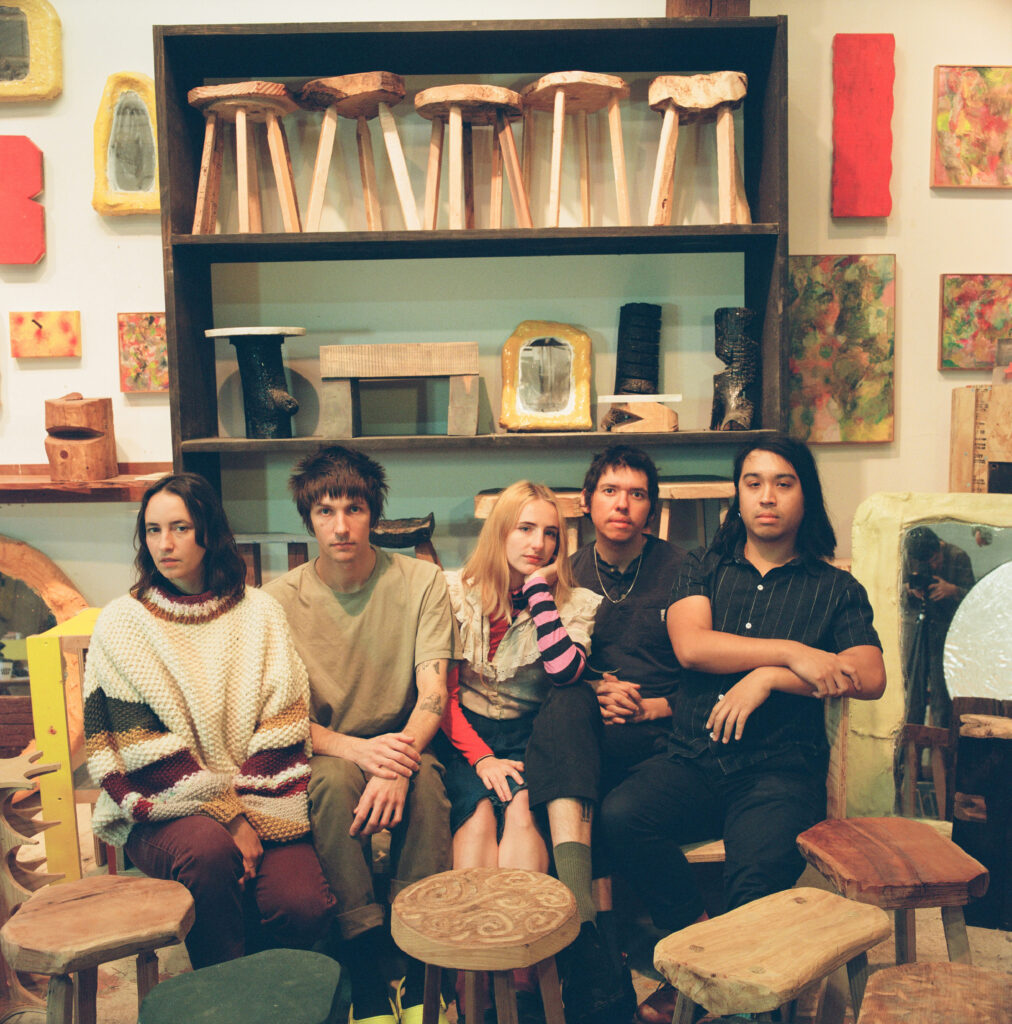
While Foyer Red’s infancy has been the sort of smooth, instant success story many artists would kill for, the material realities are still tough. Living in New York City is more untenable than ever, especially for artists trying to maintain double or triple lives. Foyer Red’s buzzy early days don’t equate any more financial stability, and each member still grinds away at day jobs — Ocampo works in tour booking, Myers in retail, Jaso in freelance software development, and Riordan and Moore at restaurants. Ocampo admits there was a learning curve of unrealistic expectations: “It’s not 2010 anymore when you got a Pitchfork review and your life is set musically.” On the outside, it might seem like a band taking off, but their day-to-day lives haven’t changed so much. It makes them emblematic of what it takes to maintain a band in New York City in the 2020s — an unforgiving and delicate balancing act.
For a band that began over email but now thrives on the live interplay between them, they have already considered what might happen if any of their days in New York come to an end. Ocampo says they’ve already considered comparatively cheaper options in the city’s orbit, the tried-and-true pipeline to Upstate or Philadelphia. But at the same time the band are trying to navigate the sudden busyness and responsibilities that come with an official record deal and debut, you can also sense how exuberant they are, the excitement they’ve found just by simply having five friends finally decide to make music together. For now, they’re just starting to do what they love most — get back into the room and play off each other, jamming out even more adventurous ideas.
“I feel like this collection of songs is still testing where the band can go sonically,” Ocampo says. “It’s just seeing what we want to keep exploring.”

